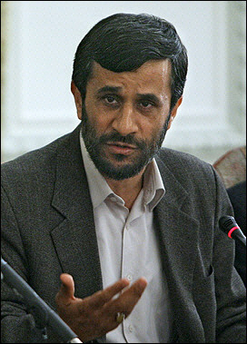President Mahmoud Ahmadinejad vowed he will not back down "one iota" over
Iran's nuclear programme as Washington denied reports that it is in the early
stages of planning a military assault.

Iran's President
Mahmoud Ahmadinejad, pictured here in March 2006, vowed again 11 April not
to give in to the Security Council demand and many diplomats say the
United Nations may be forced to take take action. The United States wants
to settle the Iran nuclear crisis through diplomacy, President George W.
Bush said, describing reports of plans to attack Iran as "wild
speculation." [AFP] |
In a typically defiant speech, Ahmadinejad also promised "very good nuclear
news in the coming days" -- just as International Atomic Energy Agency (IAEA)
chief Mohamed ElBaradei is scheduled to visit the Islamic republic.
"Be certain that the government which serves you will follow the wishes of
the people with wisdom and strength, and will not back down one iota," the
hardline president said in a speech carried live on state television.
"Our enemies know they are unable to even slightly hurt our nation and they
cannot create the tiniest obstacle on its glorious and progressive way," he
insisted. "They cannot stop our nation."
A military official said the "good news" concerned developments in enrichment
work.
Iran categorically rejects charges that it is seeking atomic weapons and has
so far rejected a UN Security Council demand for Tehran to freeze sensitive
enrichment work.
His comments came amid explosive new reports in the United States saying that
President George W. Bush is mulling military options to knock out the Islamic
republic's nuclear programme.
The New Yorker magazine reported in its April 17 issue that the
administration is planning a massive bombing campaign against Iran, including
use of bunker-buster nuclear bombs to destroy a key suspected Iranian nuclear
weapons facility.
And Sunday's Washington Post reported that Bush is studying options for
military strikes as part of a broader strategy of coercive diplomacy to pressure
Tehran.
Bush dismissed the reports as "wild speculation", saying the focus remained
on a diplomatic solution.
"The doctrine of prevention is to work together to prevent the Iranians from
having a nuclear weapon," Bush said at Johns Hopkins University in Washington.
"I know we hear in Washington 'prevention means force'," he added.
"In this case, it means diplomacy, by the way. I read the articles in the
newspapers this weekend -- it was wild speculation," he said.
White House spokesman Scott McClellan said however that Bush is not taking
the military option off the table.
Meanwhile the deputy head of Iran's atomic organisation, Mohammad Saidi, said
an IAEA team was visiting a uranium ore conversion plant at Isfahan and would
later visit an enrichment facility at Natanz.
ElBaradei's visit, due to begin on Wednesday according to diplomats close to
the UN agency, is his first to the country this year and comes amid growing
international pressure on Tehran to suspend its uranium enrichment activities --
seen in the West as a cover for weapons development
Enrichment is the process used to manufacture fuel for civil nuclear power
stations but can be also be extended to manufacture the fissile core of an
atomic bomb.
On March 29, the UN Security Council called on Iran to suspend uranium
enrichment to provide a watertight guarantee that its nuclear programme is
peaceful, and asked ElBaradei to report on Iranian compliance after 30 days.
In Europe, the New Yorker story was dismissed Sunday by British Foreign
Secretary Jack Straw as "completely nuts".
EU foreign policy chief Javier Solana said the 25-nation bloc could consider
slapping sanctions on Iran, including a visa ban, if current UN-centred
diplomatic efforts fail.
Iran has dismissed any talk of an attack against it as "psychological
warfare", and Iranian army chief of staff General Abdolrahim Mousavi told the
ISNA news agency that Iran was "vigilant" and ready to fight back.
"We know America's nature, and we are keeping enemy movements under
surveillance. We are aware of their oppressive actions and goals against the
Muslim nations," he added.
World oil prices rose Monday, hovering around 68.0 dollars per barrel on
market jitters over a potential military conflict between the United States and
Iran, dealers said.